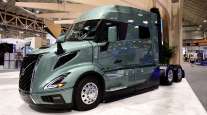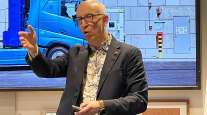Volvo to Offer New Alt. Fuel For Its Heavy Trucks in 2015
This story appears in the June 10 print edition of Transport Topics.
SACRAMENTO, Calif. — Volvo Trucks said it will begin selling Class 8, over-the-road trucks powered by dimethyl ether starting in 2015.
At a press conference at the state Capitol here on June 6, Volvo officials said they have already begun field-testing DME trucks with one fleet and will soon add a second test in conjunction with food-store chain Safeway Inc., a fuel producer and a local governmental agency in California.
“We look forward to further validating DME technology for the trucking industry,” said Göran Nyberg, president of Volvo Trucks’ sales and marketing efforts.
“We believe the fuel shows great potential for the North American market and, when produced from biomass, it can provide a 95% reduction in [carbon dioxide] compared to diesel.”
With these moves, Volvo said it is making DME an accessible alternative to compressed natural gas and liquefied natural gas in the race to replace diesel as trucking’s primary fuel.
Following through on promises it made a year ago, Volvo said a bulk hauler has been testing three DME-powered trucks since December. DME is a fuel that can be produced from organic waste or can be processed from natural gas.
Company officials said that Safeway will begin running two of its VNL models equipped with 13-liter engines that have been modified to run on DME. Volvo’s first DME trucks have been running over the road in North America since December at a bulk tanker fleet owned by Martin Resource Management Group.
Volvo officials first announced interest in utilizing DME in North America a year ago during a press conference in Florida, when Volvo Group President Olof Persson said the company would produce an engine to run on the fuel.
Up to now, natural gas has been the only alternative to diesel, with CNG finding customers mainly in local delivery markets and LNG beginning to make small inroads in over-the-road trucking.
At the press conference, officials from Volvo, Safeway, Oberon Fuels and the San Joaquin Valley Air Pollution Control District discussed the test. The trucks will run in the San Joaquin area, and the district agency contributed $500,000 to the test.
Volvo said the trucks will run on fuel produced by Oberon, which it said has developed portable, small-scale production units that can cost-effectively convert biogas and natural gas to DME.
Volvo’s original interest in DME was spurred by its Swedish roots, since it can be produced from so-called “black liquor,” a hazardous waste produced by paper producers. Several paper manufacturers have plants in Scandinavia, and the process allows them to convert the waste into a useful fuel.
“The Oberon process enables previously wasted resources to be converted to clean-burning DME,” said Neil Senturia, CEO of Oberon.
DME can be made from a number of feedstocks, such as food, animal and agricultural waste, as well as from natural gas.
Safeway, meanwhile, is participating because “it is very interested in alternative fuels” and already runs Volvos in its fleet, said Tom Nartker, vice president of transportation for the food chain.
Volvo also said it would introduce its own LNG-powered 13-liter engine during 2014 for its VNL day cabs and sleepers.
Up to now, Cummins Westport, a joint venture of Cummins Inc. and Westport Innovations, has been the virtually exclusive supplier of LNG and CNG engines in North America. Westport also sells a dual-fuel LNG-diesel engine, and Cummins is working on its own LNG big-bore engine.
Until recently, the Cummins Westport engine was available only in smaller power units, although the company has recently introduced a 12-liter model. Cummins Inc. is working on a 15-liter model it expects to introduce in 2015.
Nyberg said Volvo has “completed more than 650,000 miles of DME testing” on its engines, with many of the miles coming from the Martin fleet.
In remarks at the June 6 ceremony, Nyberg said DME is clean, doesn’t require a diesel particulate filter, is safe to store and is nontoxic. It also doesn’t need to be stored at extremely cold temperatures like LNG or under high pressure, like CNG.
Seyed Sadredin, executive director of the San Joaquin Valley Air Pollution Control District, said the agency contributed the money to the DME test because it “is an exciting fuel . . . [that] has the potential to improve air quality, which is a major challenge in the San Joaquin Valley region.”
Test drivers have been pleased with the performance of the DME engines, Nyberg said, and Volvo expected the fuel to be competitive with diesel and not subject to the price swings that are common to petroleum-based products.
The DME engines will be assembled in Maryland, where all of Volvo’s North American engines and transmissions are assembled.




